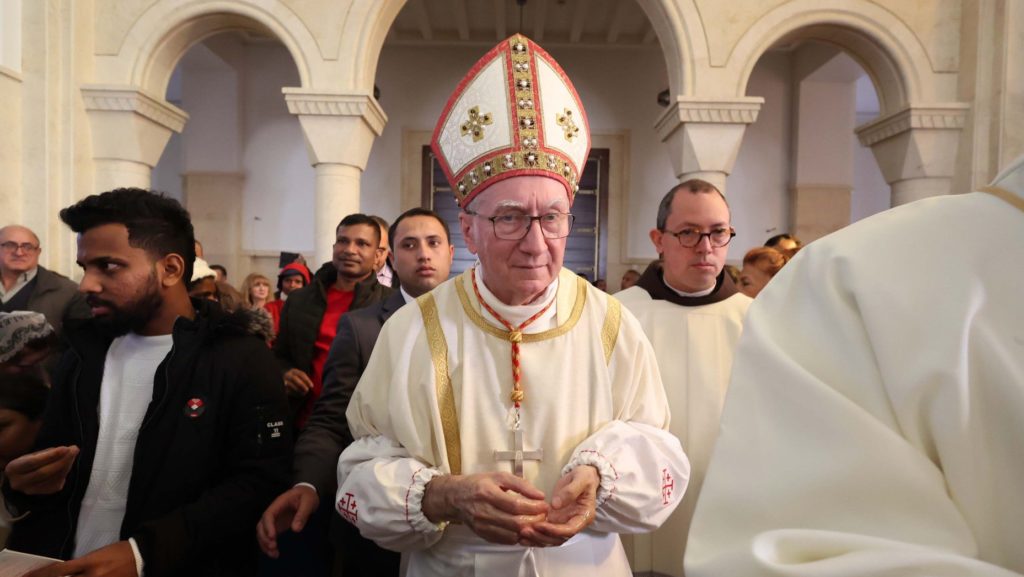Vatican Secretary of State Italian Cardinal Pietro Parolin on Monday held a meeting with papal representatives throughout the Middle East to discuss the fallout of regional conflicts and the need for peace, as well as the importance of Christians in the Middle East.
Parolin for the past few days has been in Jordan for the dedication of the Church of the Baptism of Jesus, situated at Bethany Beyond the Jordan, believed to be the baptismal place of Jesus, on the banks of the Jordan River.
According to a Vatican communique, Parolin on Jan. 13 presided over a meeting in Amman with the papal envoys to various Middle Eastern nations, including Bahrain, Egypt, the United Arab Emirates, Jordan, Iran, Iraq, Kuwait, Oman, Qatar, Syria and Yemen.
Also present were the papal representatives of Israel, Palestine and Lebanon, the key players in the ongoing war in Gaza.
Topics addressed during the meeting, according to the communique, included various regional crises and the ecclesial situation of each country represented, as well as the “visible signs of hope in some of these countries.”
Also discussed was the “serious humanitarian situation” of those in conflict areas, and the need for increased solidarity from the international community.
“Hope was expressed that there would soon be a cessation of hostilities on all fronts and that the Middle East could be a land of peace, where Christians remain an essential element of fraternal coexistence among the various religions and of the progress of the respective nations,” the communique said.
The meeting, among other things, provided Parolin with a platform to push the Vatican’s calls for negotiations and for a ceasefire in Gaza, and it also illustrated the Holy See’s desire to serve as a mediator for the conflicts, crises and tensions affecting the region.
Parolin on Monday also had a private phone call with Lebanon’s new President, Joseph Aoun, who was elected Jan. 9, bringing an end to a years-long political stalemate and presidential vacuum.
Lebanon had been without a president since October 2022 and was run by an interim government amid a crippling financial crisis compounded by the outbreak of hostilities between Lebanese group Hezbollah and Israel.
In a Jan. 11 interview with Vatican News, the Vatican’s official state-run information platform, Parolin called Aoun’s election “a positive sign.”
For the past two years that Lebanon has been without a government, he said, the Vatican has insisted that electing a president “was crucial for the continuity and survival of the country as it is structured…a country where social, political, and religious diversity coexist.”
“We sincerely hope that this election will mark a new phase for Lebanon, where all political forces come together to find common ground and work for the good of the country, particularly for the reforms the country so urgently needs,” he said.
Parolin lamented the general failure of diplomacy to resolve current conflicts in the Middle East, including the war in Gaza, saying, “It is truly saddening that we seem to have lost the ability to negotiate and that, as they say, the force prevails over the rule of law.”
He said a lack of “basic trust” is to blame, insisting that for negotiations and dialogue to be effective, “there needs to be at least a minimal level of trust in the other party.”
“There needs to be a willingness to meet halfway, to understand or at least seriously consider the reasons of the other side. These are the reasons why negotiating has become so difficult today,” he said, saying international institutions established to foster dialogue have been incapable of doing so.
In terms of achieving peace, Parolin stressed the need to move beyond divisions and viewing one another as the enemy.
A “just peace,” he said, must be “founded on international law and the declarations of the United Nations. These are the tools the international community has at its disposal to regulate relations among countries and between communities of states.”
Parolin called the dedication of the Church of the Baptism of Jesus a sign of hope in a region torn by conflict.
He also underlined the importance of the Christian presence in the Middle East, which he said goes beyond ethnicity, adding, “Arab also means Christian because there is a Christian community rooted in the history of these lands.”
Regarding the war in Syria and the recent fall of Syrian President Bashar al-Assad, Parolin voiced hope that “a new era can begin for Syria, where all citizens will have the same rights and privileges.”
“This is the concept of citizenship that the Holy See also proposes for all countries: all citizens are equal, with equal rights and equal duties before the law,” he said.

